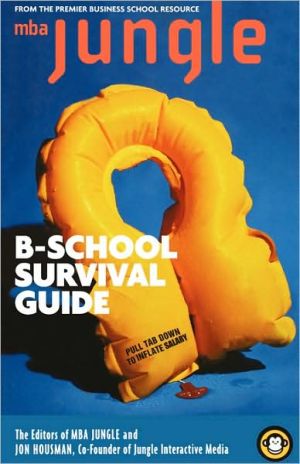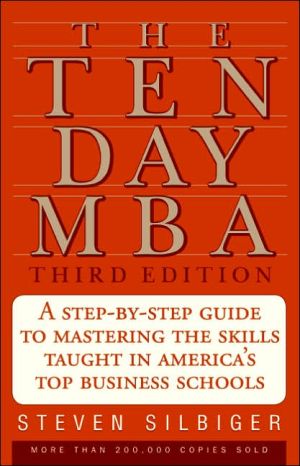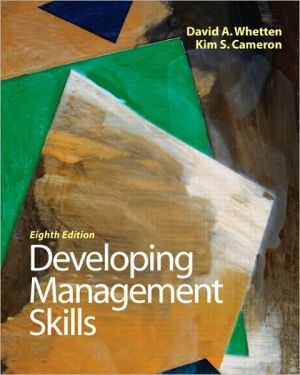MBA Jungle B-School Survival Guide
The official handbook for B-school culture and customs, The MBA Jungle B-School Survival Guide is filled with insights on the MBA experience. It also offers practical advice with a flair and sophistication that will appeal to current and would-be MBA students. Far from your same-old sawdust-dry business-school guide, The MBA Jungle B-School Survival Guide is smart and witty, yet still manages to take business seriously. It covers a full array of topics-from determining if an MBA track is...
Search in google:
From the creators of the MBA Jungle magazine and website comes a hip must-read for present and future MBAs, or anyone in business who wants to learn the B-school handshake. Library Journal Housman is the cofounder of Jungle Interactive Media, which publishes the magazine MBA Jungle and its corresponding web site (www.mbajungle.com). He and the editors of MBA Jungle have put together this excellent guide to help prospective business students get the most from their MBAs. Chapters that cover making the decision to attend business school and choosing a business school will be of particular interest to prospective business students, while sections on networking while in school, interviewing for a job, and comporting oneself in the business environment could be of use to anyone hoping to succeed in the workplace. The guide goes into specifics in a number of key areas: it takes the reader through a typical week in the life of an MBA student, gives detailed strategies on making the recruiting dinner successful, and details an interview with four recruiters, analyzing the answers to eight typical interview questions. There is also a section on how to find an international job. An appendix includes a discussion of the importance of business school rankings. Highly recommended for both public and academic libraries. Stacey Marien, American Univ. Lib., Washington, DC Copyright 2001 Cahners Business Information.
Excerpt from Chapter 2: \ To B-School or Not to B-School?\ -( A Diagnostic Quiz)\ ...interact with lawyers, create Excel spreadsheets, and . . . little else. Plug and chug becomes a way of life. However, the experience can be intense and instructive, and when you do well, you move up the ladder to higher-level deal structuring and client interactions. After about a year or eighteen months, you gradually get more responsibilities; over the next two years, you do less and less grunt work. Needless to say, this gig is quite lucrative-if the bank has a good year, this is probably the highest-paying job out of B-school.\ I-bank option two is sales & trading. Traders buy and sell securities and commodities. They arrive well before the market floodgates open (usually between 6:30 and 7:30 A.M.) and collapse around 4;30 P.M. If you enjoy the thrill of high-stakes poker, not to mention managing client relationships, this could be your calling. It's hands-down the best pay-to-working-hour ratio in the business, and lavish client entertainment is typically a must. This is a great option for closers who are early risers and socially inclined. For recent grads, compensation runs about $75,000 to $85,000 a year plus year-end and signing bonuses that can basically double the salary.\ The field of equity research is considered more cerebral than sales & trading. Here, the goal is to become the expert on an industry or industry subsector-cars, retail, pharmaceuticals, telecom, health care, Latvian knockwurst, whatever. You start as an associate, and twelve-hour days are par for the course. After a few years, you can become a lead analyst in a particular industry, where you get direct exposure to some of the best minds in business: CFOs and other top corporate officers. The pay shoots up as well.\ Money management also has its perks: Whether in private client services or portfolio management for a big mutual fund company, you research companies and make investments on behalf of your firm or clients. You might specialize in a niche (e.g., South American large-cap value) or explore whatever strikes your fancy. The work is hard and the competition tough, but strong performers get large amounts of responsibility fast, either at the firm or on their own. This is definitely a field where you can take your track record and go into business for yourself. As for pay, many B-school grads start at about $80,000 plus bonus and move up from there. Fund managers pull in seven figures and get a piece of the action. It's nice to be a fund manager.\ Private equity and its subset, venture capital, are hot right now. Chances are you'll have to pay your dues in traditional I-banking first, but if you can land a job at a venture capital firm, you can play God with your classmates' business plans. Lots of travel, but the reason is more to meet company management and attend board meetings-unlike a consultant, who may be stuck somewhere for six weeks. In the VC/ private-equity world, your compensation is broken up into salary, bonus, and "carried interest." Salaries generally range from $100,000 to $200,000, and bonuses in good years can be greater than base salary. Carried interest is calculated in many ways, but basically it's the profit split of proceeds to the general partners. A ten-year industry veteran might make upward of $1 million. Oh, and if you discover the next Yahoo!, it would be considerably more. It's good to discover the next Yahoo!\ The financial performance of investment banks tends to follow the market as a whole. Downturns mean smaller bonuses and possibly layoffs. Upturns tend to put you on the gravy train.\ Consulting\ For those who prefer PowerPoint to Excel, there is consulting. Consultants generally work in teams to solve problems or craft strategy for client companies. It's a tremendous job for people who aren't sure where they want to end up, since they can often "sample" different industries and functions. The job also offers great exposure to senior client executives-and making a good impression can mean a lucrative job offer down the line.\ Consulting comes in just about every imaginable size and flavor. Big firms vs. boutiques, generalists vs. specialists, strategy vs. implementation. Each has its idiosyncrasies. While not every consultant spends five days a week on the road, you should be prepared for some travel. As an associate, you could spend a month in Austin helping a high-tech company launch a new product and two weeks later be in New York preparing a slide deck called "strategic insights" for a major consumergoods producer. As you move up, you do more high-level synthesis and client relationship management.\ Just out of business school, you can expect to make any where from $75,000 to $150,000 in the consulting industry. Typically, you start out as an associate or a consultant, and move up to engagement manager, principal, and finally, over six to ten years, partner. What do partners pull down? There's a huge, huge range, but here are a couple of numbers to put in your back pocket: At most shops, a partner makes well into the six figures (certainly over a half mil), and at top shops, like McKinsey, you could be looking at seven figures.\ For the risk averse, consulting is relatively recession-proof. Companies need expertise in good times and in bad.\ Marketing\ If you have good "soft" skills and like brand issues (pricing strategies, new product development), you might be happy as a brand manager for a consumer-products company. Recent Bschool grads might start out as an assistant marketing manager, eventually working their way up to a director- or VP-level position. Marketing managers develop, launch, and manage products as diverse as computers, web sites, butter substitutes, pet snacks, medical devices, pants, credit cards, and soda pop. Starting salaries range from $75,000 to $100,000 for recent graduates. In marketing, the pay doesn't increase as rapidly as in other fields: Five years out, you could be looking at $150,000, and ten years out, between $200,000 and $300,000. Some say that generous perks-both from your employer and from vendors-can somewhat make up for lower paychecks. Hours, too, tend not to be as intense as in consulting or banking, although brand review periods are notoriously tough. Related fields like advertising and public relations also hire MBAs, though not as aggressively as "pure" marketers.\ A Few Other Fields\ If your goal is to attend the MTV Video Music Awards, dive into the media & entertainment scene. One option is to join the M&E practice at a big bank or consulting firm. But there are also opportunities for MBAs in business development, marketing, finance, and strategy for big media conglomerates like Disney, AOL Time-Warner, Bertelsmann, and Viacom. M&E salaries for recent grads aren't as high as their Big Three counterparts. Still, if you like the idea of rubbing elbows with the "in crowd" in New York or L.A., you might not mind the pay haircut. You're looking at a starting range of $70,000 to $100,000.\ If you like the sound of "mogul," don't overlook a career in real estate. Project management for a developer involves organizing the construction process from site to sale. Real estate operations in investment banking, private equity, and commercial banking deal with the money that goes into funding property development, renovation, or purchases. Be prepared for long hours with few perks; B-schoolers who enter this field are strong in quant skills and don't mind putting in their time. Expect a starting salary in the range of $80,000 to $100,000.\ If you're seeking risk and commensurate reward, entrepreneurship could be your cup of tea. Taking a job with a start-up can still be a great learning opportunity for a freshly minted MBA. First it was e-commerce and wireless; now it's all about optical networking plays and interactive TV But there are also furniture stores, T-shirt manufacturers, restaurants-the possibilities are endless and ever-changing, and the salaries depend on the particular company. The upsides include increased responsibility, nontraditional job titles, really cool office interiors, an average age peaking at thirty-five, and stock options that could net you a small fortune if you and your company deliver. The downside? Job insecurity and a less-structured work environment. But if you're looking to strike out on your own, it'll help you learn not to take a paycheck for granted.\ Finely honed business skills are also much sought after at nonprofits. As in for-profit companies, you may find yourself working in finance, HR, strategic planning, marketing, or general management. And nonprofits are much more than the local art center: Greenpeace, the Red Cross, or the American Cancer Society all potentially hire MBAs.\ Of course, this is just a taste of what's ahead. You'll find out a great deal more about each of these careers, and others, as you go forward. You'll hear from other students who have worked in these industries, you'll attend plenty of career presentations, and you will have the chance to test-drive an industry during your in-between summer.\ WHAT WILL YOU BE STUDYING?\ So what kind of "business" do they teach in business school anyway? Open the course catalog for any B-school, and you'll do one of two things: Either you will proceed directly to the section for the major you're interested in, or you'll be overwhelmed by the number and variety of classes, majors, and tracks available.\ You will be required to choose a concentration for graduation, but don't worry, you won't have to decide right away. Since B-schoolers come from all walks of life, nearly all programs require first-years to take a group of core classes, designed to put everyone on a level playing field. They'll provide you with a basic grounding in the main areas of study, and you will be that much better prepared to focus on one (or more) for the remainder of your term. And remember: A B-school major doesn't lock you into a specific career; it's perfectly reasonable for a former consultant to round out her skill set by majoring in finance and then to go on to work for a high-tech start-up.\ The most popular B-school concentrations are: management, finance, and marketing. Other oft-chosen majors include strategy, operations, public policy, real estate, insurance/ risk management, and organizational behavior. Newer programs that are showing up in more and more schools' rosters include e-business management, entrepreneurship, technology/innovation, media/entertainment, and international busi ness. Diehard number crunchers gravitate toward the everuseful-if not always sexy-accounting, statistics, tax, or economics.\ Keep in mind that most schools offer alternatives to the traditional major. So, for example, you may major in finance but have a concentration in a newer area, like entrepreneurship or media/entertainment. This allows you to focus on multiple areas. Some schools will let you minor in such fields as trans portation, arts administration, environmental management, and legal studies.\ Even within a major, some schools have subspecialties. So, for example, within a management major, you might focus on health-care administration, hotel administration, human resources administration, multinational business management, or industrial management. In short, you can go as broad or as specific as you want.
MBA Jungle Contributorsix1The Art of Success12To B-School or Not to B-School (A Diagnostic Quiz)5To B or Not to B?5The Payoff13What Will You Be Studying?18Top MBA Recruiters203Choosing the Right School23Part-Time Versus Full-Time: How Do You Take Your MBA?24The Dual Degree--Two-for-One Special26Seven Tips to Make Part-Time Work for You27Paying for the MBA31B-School Comparisons33Category Leaders36An International Perspective38Women on the Verge424Getting In47Getting into Top-Choice Schools47Where to Apply: How to Pick the Right School for You48Understanding the GMAT59The Man Behind the GMAT: Interview with a Test-Writer69What Does It Take to Get In?735Are You Ready for B-School? Are You Sure?75Calm Before the Storm75Eight Books You Gotta Read Before B-School78Ready to Talk the Talk?79What to Bring to the Party--The Tools, the Gear, the Attitude86Six Things You Can Leave at Home896B2C--Back to the Classroom93Start Smart, Start Strong93Class in the Classroom97A Week in the Life of an MBA100Choosing the Curriculum: Electives Versus the Core104How to Spot a Top Prof1057The Learning Team--Like Survivor, but with Graph Paper109Ten Ways to Annoy Your Teammates120How to Deal with Troubled Teammates1218The Recruiting Game--Building the Network123Networking: Winning Strategies123Network with Professors--Without Kissing Up130Six Ways Not to Impress a Prof134Why Your Resume Got Tossed--And What You Could Have Done to Prevent It135Leaving the Perfect Voice-Mail Message1379Mastering the Interview141The Interview141Four Killer Questions148Five Things Not to Do in an Interview152Disaster Relief: Survival Strategies for Recruiting Calamities153Interviews Gone Bad160Job Hunters from Hell16210Advanced Recruiting Tactics165Twenty-Eight Tips for Getting the Job You Want165Dining for Dollars172B-School Entrepreneurs: Six Things to Do While Still in School17811Working Abroad183Taking the Job Hunt Overseas183The Long Way Home18812Getting Back to Business19713Lessons from B-School's Best Minds205Eight Things that Are Not Quite as Important to Remember212Epilogue: How to Blow Off Steam--A Primer213Appendix ABusiness School Rankings219Appendix BIndustry Guides231Index252
\ Library JournalHousman is the cofounder of Jungle Interactive Media, which publishes the magazine MBA Jungle and its corresponding web site (www.mbajungle.com). He and the editors of MBA Jungle have put together this excellent guide to help prospective business students get the most from their MBAs. Chapters that cover making the decision to attend business school and choosing a business school will be of particular interest to prospective business students, while sections on networking while in school, interviewing for a job, and comporting oneself in the business environment could be of use to anyone hoping to succeed in the workplace. The guide goes into specifics in a number of key areas: it takes the reader through a typical week in the life of an MBA student, gives detailed strategies on making the recruiting dinner successful, and details an interview with four recruiters, analyzing the answers to eight typical interview questions. There is also a section on how to find an international job. An appendix includes a discussion of the importance of business school rankings. Highly recommended for both public and academic libraries. Stacey Marien, American Univ. Lib., Washington, DC Copyright 2001 Cahners Business Information.\ \ \ \ \ BooknewsThe scoop on business school, in 13 chapters, many first published in magazine (of which Housman is a co-founder; he also is affiliated with the New York U. Stern School of Business, among other enterprises). He covers making the decision to enroll and how to do it as well as strategies for choosing courses, building networks, interviewing, and generally surviving intact. Annotation c. Book News, Inc., Portland, OR (booknews.com)\ \








